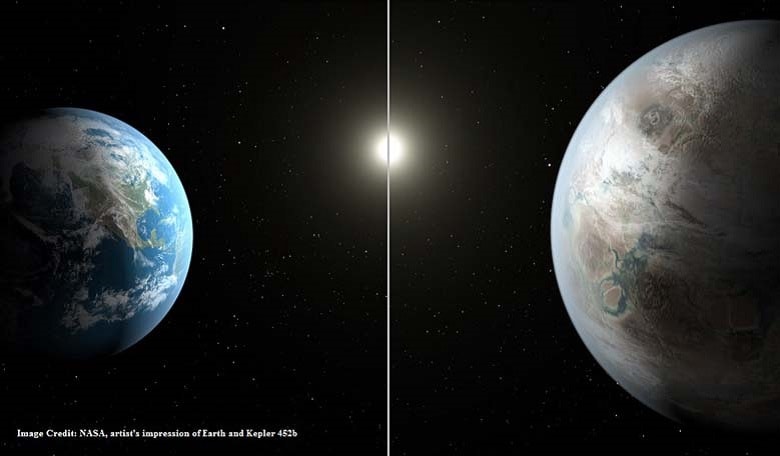The most Earth-like exoplanet yet may have a lot to teach us…about ourselves.
Kepler 452b, discovered by the Kepler Telescope, is located in our own galaxy, the Milky Way. In terms of the vastness of space, it is relatively “close” – a mere 1,400 light years away from us.
Everything we currently know about biological life dictates that in order to sustain it, a planet must have water on its surface – and Kepler 452b may very well have that.
Crucially, Kepler 452b has spent billions of years orbiting within a so-called habitable zone around its star – meaning it’s not too close, and hence too hot, and not too far away, and hence frozen.
Kepler 452b’s is 60 percent larger in diameter than Earth and its gravitational pull is twice stronger.
In spite of all the hype that has, inevitably, erupted around Kepler 452b’s discovery – its importance has little to do with our immediate desire to speculate about “little green men” whenever we encounter proof that yes, there are worlds out there that are similar to ours.
Humanity is not very likely to get confirmation of any sort of life – intelligent or otherwise – as ever having had a presence on Kepler 452b.
But what such discoveries do give us chance to reflect on how we reconcile the existence of our own species with the possibility of similarly intelligent (perhaps far more intelligent) species.
Willingly or not, we tend to think of our species – and everything it goes through here on Earth, from love to war – as more important and more “real” than any of that stuff that exists far beyond the bounds of our planet.
But it’s a big universe out there. Our reality is just a miniscule fraction of that is contained within our own galaxy – itself one of a staggering number of galaxies.
When people going about their daily lives are suddenly confronted with the news that Earth isn’t that unique after all, they are understandably stunned. But only because the minutiae of our day-to-day existence obscure the fundamental facts of how stars and solar systems and Earth-like planets are formed. The reality of outer space is radically separated from our own merely due to distance.
The discovery of Kepler 452b is a good chance to reflect on Earth from an outside perspective. What if we are not alone after all? And what if, as Wired has recently suggested, more advanced civilizations can hear us? The technology that we have today presents Kepler 452b as a kind of abstraction – we know it’s there, due to its effect on its star, but we can’t really perceive it.
It is certainly in the realm of possibility that other life forms can perceive us, however. And if that’s not a call for self-reflection – then what is?











